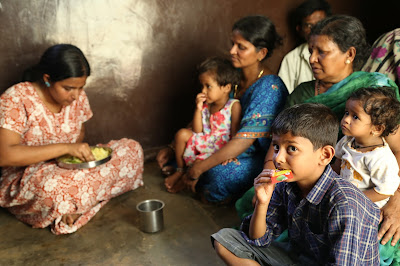Attitude among the Poor towards a Good Education
This year I was brought into
the Shanti Bhavan team that selects children for the new pre-school class. My
training in psychology and a graduate of the school were considered helpful to
the process.
Being no stranger
to the typical rural life and its cultural disposition, I was
confident on providing useful insight into the behavioural and social dynamics
that are integral to marginalized communities. By the end of our two months of
search, we came to a few realizations.
The face of rural communities
had undeniably changed over the last decade as job opportunities created by urban
industrialization had significantly impacted their life-style. Many commuted
daily to cities to work as security guards, housemaids, drivers, construction
workers, and in other low level jobs, contributing largely to the labour
requirement of businesses.
Very often we came upon
locked houses and deserted streets, with children away at the local government
school and both parents at work. Women like my mother who were once confined to
their domestic duties now sought jobs in the cities, sharing the financial burden
of the household with their spouses. With today’s high cost of living, it is
not an option but a necessity for families, especially among the poor, to have
more than one bread-winner.
At times we encountered
passive resistance from the villagers. It didn’t make sense to them to send
their children to a distant boarding school when the local government school
offered free education, a mid-day meal and other assistance. I felt saddened to
see that they couldn’t distinguish the quality of education in such schools and
the one that Shanti Bhavan offered.
One time I came upon a
settlement of small, thatched houses in the centre of a village. A group of
elderly women were seated on a straw mat, sharing tobacco. I introduced myself
politely and asked, “We’re looking for children from very poor families for our
free boarding school. Do you know of any one here?”
To my surprise, one woman instantly
replied with a level of indifference, “There’s no one poor here. You can go to
the next lane.”
I was taken aback by her directness.
The only explanation I could find for her denial was that people like this
woman don’t consider themselves poor as a result of the subsidies they receive
from the government in the form of hand-outs – food, clothing, free education,
free transport for children back and fro from school and loans for house
construction. A sense of contentment had taken hold among these poor people as
their basic needs were being met.
But for the most part, we
found villagers welcoming of our interest in their children. Their sense of
appreciation might have come from the many services offered to their
communities by several NGOs.
Our experience in urban
slums was somewhat different. The urban poor seemed to be more ambitious about
their children having good careers. This difference in mind-set might have been
from the exposure to the affluence in the society around them, and by observing
the hierarchy of job positions in companies. They were willing to consider the
possibility of a good future we were offering.
What I found common among
both the urban and rural poor was that they struggle to grasp the true power of
a good education for their children, and its longer term impact on their families.
They fail to recognize the innate potential in their own children to achieve
personal and professional success.
But despite the lack of
awareness among people like them, I still felt optimistic. There were many who
were eager to seek our assistance. It was humbling to see that even in the face
of hardships, they were dreaming of a better tomorrow.




Comments
Post a Comment